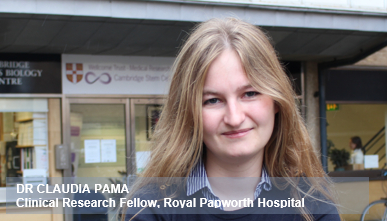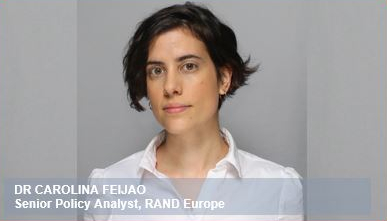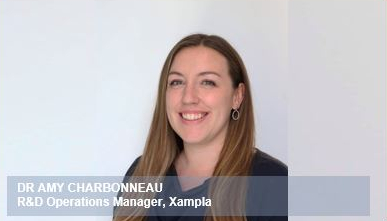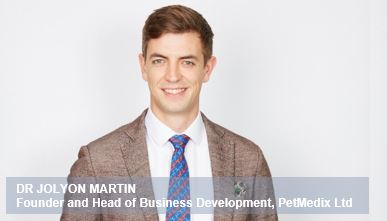Find out what our Alumni have to say about their journey from DTP PhD into a successful career, the impact the programme has made, and give some valuable advice to current and future DTP PhD students:
|
Dr Claudia Pama - Clinical Research Fellow, Royal Papworth Hospital
"The DTP programme has been great in supporting my academic translational interests through giving me the space and opportunity to connect the specialties of my two rotation labs and set up a translational collaboration between the Department of Veterinary Medicine / WT-MRC Stem Cell Institute (cellular neuroscience / myelination) and the Department of Psychology (behavioural neuroscience / cognition). Most importantly, however, the programme has allowed my PhD experience to go further than the lab alone. The DTP has supported me throughout my other endeavours, such as publicising the Mental Health Event I organised in 2017 at St John’s College, and the PIPS internship was a great opportunity to explore the editorial part of science at Science AAAS, both here in Cambridge as well as Washington D.C. Perhaps most importantly, the programme has supported me when I fell ill with cancer in the first year of my PhD, and subsequently backed the campaign I led to change the funding landscape for PhD students who fall ill during their course. The structure of the DTP has created a strong cohort, enhancing the experience of doing a PhD, and I have made many invaluable professional as well as personal connections. My personal and academic experiences have strengthened the clinical interest I always had, which led me to pursue a pre-clinical trial focussed postdoctoral position at Cambridge University after finishing my PhD, followed by a clinical research fellowship at the Royal Papworth Hospital where I am working now." |
|
| Dr Tim Jenkins - Assistant Professor, Technical University of Denmark "I think what really helped me prepare for where I am now is the diverse interactions that I had during the BBSRC DTP program. I thought it was absolutely awesome to interact with all of these different, really smart people who were working in a whole array of different fields and build a network and connections, many of whom I'm still in touch with. In terms of advice that I would like to give any of you here on this programme or thinking about joining the program, just be open for opportunities. Do not be too fixed on your own project, don't just look at what you can currently do to make your project better but look at other opportunities. Look at ways to involve other researchers.The PIPS is something that a lot of people don't really fully appreciate, and I think that's a shame, because it's a huge opportunity to again expand your network, get out of your comfort zone, explore a different thing, and you should really make the most of that because it can be either a nice bridge to where you want to go after you complete your Ph.D, or it could even present you with some opportunities to figure out what you don't like to do, or at least aspects of work that you enjoy more or less. I think the most important thing is make friends, make connections and enjoy your time because it is one of the times that I think I and all of my cohorts cherish most of my life, and a time in my life that I will never forget" |
|
|
Dr Carolina Feijao - Senior Analyst in Science and Emerging Technology, RAND Europe
"In my PhD I researched plant cell wall structures for optimising their use in the biofuel and food industries. The practical focus of the BBSRC DTP allowed me to understand better how research outcomes can be implemented outside academia. In particular, as part of the DTP's Professional Internship for PhD Students, I did a placement at the UK Government Department for Environment, Food and Rural Affairs (DEFRA) where I worked on data modelling tools for evaluating agri-environment schemes. This placement was a great introduction to government policy making and it is still relevant in my current policy role. I am a Senior Analyst in Science and Emerging Technology at RAND Europe, a not-for-profit organisation that aims to improve policy and decision-making through research and analysis. At RAND Europe, I have been able to work across the research areas that I am passionate about and collaborate with entities including national research organisations and the European Commission. Prior to my policy role, I kick-started the Sustainability portfolio for Frontiers, a major Open Access scientific publisher, by leading the launch of peer reviewed journals in sustainable food systems, forests and global change and sustainable cities. This role allowed me to liaise with key experts in the field of environmental sustainability and to develop a knowledge base of research evidence that is accessible to all stakeholders. The BBSRC DTP was instrumental in shaping this career path as it provided the opportunity to look beyond my PhD research and determine how my skills could create impact in areas that I care about." |
|
| Dr David Willer - Henslow Research Fellow, University of Cambridge "I applied for a BBSRC Doctoral Training Programme in food security here at Cambridge and this was an absolutely fantastic opportunity. I got to try out a couple of different rotation projects in different labs across the university. The thing that I really valued about the DTP is that it gave me the opportunity to design and direct my own research towards the things that I was just really interested in, and I really appreciated this kind of autonomy. It gave me the chance to build new collaborations within and beyond the University which proved invaluable in allowing progression beyond the PhD. I highly recommend that you really make use of that wide range of opportunities within the Cambridge research network, join the strategic research initiatives and reach out to other departments and organizations to collaborate with you on your research. Build those networks, and this can provide the foundation to a really successful PhD. Most importantly though enjoy it. The DTP is a really fantastic opportunity to spend four years completely engaged in a topic that fascinates you, so go ahead, do it!" |
|
|
Dr Amy Charbonneau - R&D Operations Manager, Xampla
"I graduated from my BBSRC DTP PhD in 2019 and have since moved into the biotech start up space. My PhD focused on equine infectious disease, but I have always had an interest in the environment and was keen to experience life in industry. I competed my DTP Professional Internship for PhD Students in 2017 with Better Origin, a start-up founded by Cambridge students developing automated insect farms to convert food waste into insect-based animal feed. I was always intrigued by the fast paced, flexible and varied environment a start-up could offer and it didn’t disappoint. Completing my PIPs at Better Origin later led to employment as a Project Manager after I graduated from my PhD. In 2020, I moved to another Cambridge start-up, Xampla, as a Research Manager and have since progressed to R&D Operations Manager. Xampla are converting plant proteins into function materials to replace the most polluting plastics, such as PVOH films and plastic microcapsules in a range of home & personal care products. I feel very privileged to have worked for two start ups with such environmental ambition and completing my BBSRC DTP & PIPs has absolutely contributed to me developing a career in this space." |
|
|
Dr Jolyon Martin - Founder and Head of Business Development, PetMedix Ltd
Alumnus Dr Jolyon Martin who has been named in the Science and Healthcare category on Forbes list of “30 under 30 in Europe" for his work as co-founder of PetMedix Ltd, wrote this about his experience with us as a DTP student: "The DTP played an integral part in the founding of PetMedix. Through the willingness to fund a translational project, and the ability of the programme to draw on all of the bioscience related departments and institutions in Cambridge, I was able to get the broad intellectual support I needed, as well as the funding. Finally, my PIPS helped to give me a taste of the more commercial side of biotech, skills I now use every day." |
|
| Dr Richard Wang - Senior Analyst, Partners4Access "So how the DTP helped me? Well, I'd say that the the DTP program really did help me get to where I am in terms of my career. So, for example, the Careers Fairs, and the talks which the program organised really helped me see what is out there beyond lab science, and it got me interested in consulting. For example, being able to talk to some of the speakers or the invited guests that come to these events. Perhaps the most important thing is the opportunity to do a PIPS, to do a three month internship and take a break from the Ph.D. to really try something different. I did my three months PIPS internship at Partners for Access during the final year of my Ph.D., and it's towards the end of that internship they offered me a job, which I accepted. So in terms of advice, I would definitely start considering your PIPS early on your Ph.D. to be able to discuss with your supervisor when the most appropriate time is to take the three months break. Also important with regards to the timing, it is that some companies may be reluctant to give you a job offer if you're still many years out from completing your Ph.D. and being able to work, so it's a balance but something you should start looking into" |





